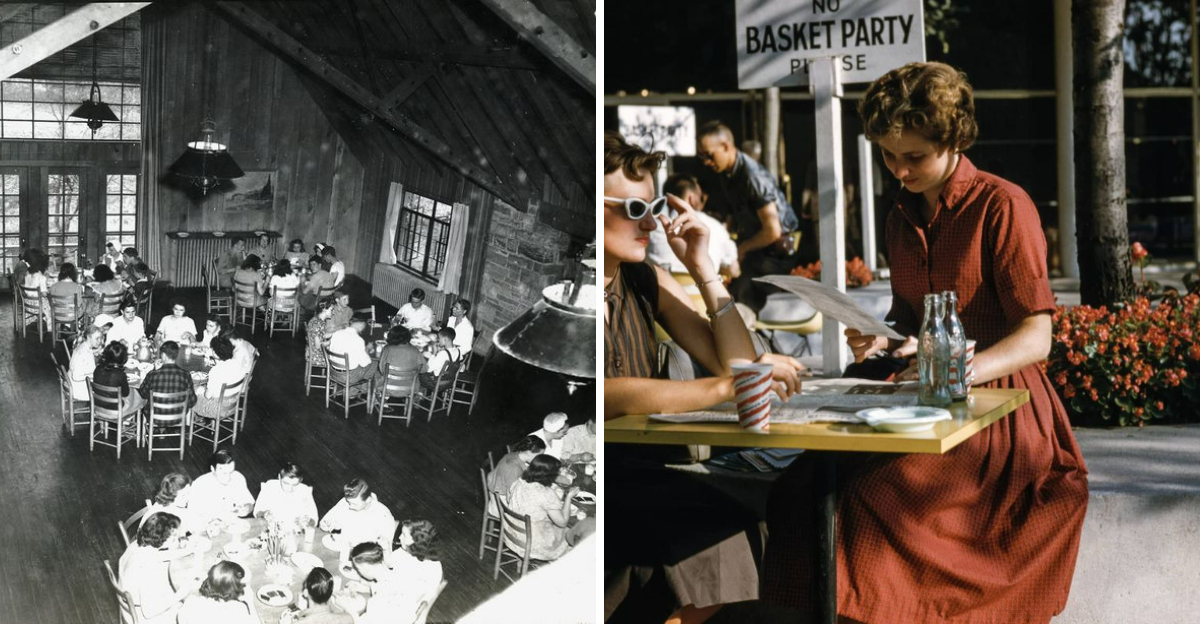17 Michigan Dinner Table Rules From The 1960s That Would Surprise Kids Today

Dinner time in 1960s Michigan looked very different from today’s casual family meals. Parents had strict expectations about how children should behave at the table, and breaking these rules often meant serious consequences.
Let me take you back to an era when mealtime manners mattered more than anything else.
1. Keep Your Elbows Off the Table
Resting your arms on the table was absolutely forbidden in most Michigan homes. Parents believed it showed laziness and disrespect toward everyone sharing the meal.
Kids learned quickly to sit up straight with hands folded in their laps between bites. Getting caught with elbows sprawled across the tablecloth meant a sharp reminder from Mom or Dad, sometimes even a gentle tap on the arm to correct the behavior immediately.
2. Wait Behind Your Chair Until Parents Sit Down
You couldn’t just rush to your seat and start eating whenever you felt hungry. Standing behind your chair until both parents sat down was a sign of respect that every Michigan kid understood.
This practice taught patience and reinforced the family hierarchy that was so important back then. Once Dad pulled out Mom’s chair and everyone was ready, only then could children take their seats for the meal ahead.
3. Never Talk With Food in Your Mouth
Speaking while chewing was considered one of the rudest things you could do at the dinner table. Michigan parents made sure their children understood that conversations happened between bites, not during them.
Kids had to chew thoroughly with their mouths completely closed before saying a single word. Anyone who forgot this rule faced disapproving looks from everyone at the table, making it a lesson they rarely needed to learn twice.
4. Place Your Napkin on Your Lap Immediately
Cloth napkins weren’t optional decorations—they had a specific purpose and placement. Before taking your first bite, you had to unfold your napkin and place it neatly across your lap.
Using your napkin to dab your mouth gently was expected, but wiping vigorously or using your sleeve instead was unacceptable. Michigan mothers took pride in teaching their children these refined habits, believing they prepared kids for success in life beyond the dinner table.
5. Ask for Items to Be Passed Instead of Reaching
Stretching your arm across the table to grab the salt shaker or mashed potatoes was absolutely out of the question. Politeness meant asking someone nearby to pass whatever you needed, even if it was right in front of you.
This simple act taught consideration for others and prevented accidents like knocking over glasses or disrupting someone else’s meal. Saying “please pass the butter” became second nature to Michigan children growing up in this era.
6. Thank and Compliment the Cook Before Leaving
Gratitude wasn’t optional when someone spent hours preparing your meal. Before you could leave the table, you had to thank whoever cooked and offer a genuine compliment about the food.
Even if you didn’t particularly enjoy what was served, finding something nice to say was expected. Michigan parents believed this practice built appreciation for hard work and taught children to recognize the effort others put into caring for them daily.
7. Avoid Discussing Politics or Religion at Meals
Certain topics were strictly off-limits during family dinners in Michigan homes. Politics and religion could spark heated debates that ruined the peaceful atmosphere parents worked hard to create.
Mealtime was meant for pleasant conversation that brought the family closer together, not divided them. Children learned early on that bringing up controversial subjects at the table would earn them a warning look or a firm reminder to change the topic immediately.
8. No Singing or Humming While Eating
Musical performances belonged in the living room, not at the dinner table. Humming your favorite tune or breaking into song during meals was considered disruptive and disrespectful to everyone trying to eat and converse.
Parents wanted children to focus on their food and family conversation instead of being lost in their own musical world. This rule helped maintain a calm, focused atmosphere where everyone could enjoy their meal together without unnecessary distractions.
9. Keep All Distractions Away From the Table
Phones didn’t exist in pockets back then, but radios and comic books certainly did. Michigan parents made sure these items stayed far away from the dining area during meals.
Dinner was sacred family time meant for face-to-face connection, not entertainment. Kids couldn’t bring toys, books, or anything else that might divide their attention from the people sitting around them, making mealtime conversations more meaningful and engaged.
10. Wait for Conversation Pauses Before Speaking
Interrupting adults mid-sentence was one of the fastest ways to get scolded at the dinner table. Children had to listen carefully and wait for natural breaks in conversation before adding their thoughts.
This practice taught patience and respect for adult discussions, even when kids had something exciting to share. Michigan parents believed that learning to wait your turn in conversation was a valuable life skill that extended far beyond the dinner table.
11. Finish Everything on Your Plate
Wasting food was considered disrespectful and ungrateful in 1960s Michigan households. Parents who remembered tougher economic times insisted that children eat every last bite on their plates.
The “Clean Plate Club” wasn’t just a cute saying—it was an expectation. Kids couldn’t leave the table until their plates were empty, teaching them not to take more than they could finish and to appreciate the resources their families had available.
12. Ask Permission Before Leaving the Table
You couldn’t just get up and walk away when you finished eating. Asking “May I be excused?” was mandatory before leaving your seat, even if you were the last person still sitting there.
Parents used this moment to check that children had fulfilled all their mealtime responsibilities—clean plate, napkin folded, compliments given. Only after receiving permission could Michigan kids leave the table to go play or do homework.
13. Sit Up Straight Throughout the Entire Meal
Slouching in your chair signaled laziness and poor discipline to parents of this era. Maintaining good posture from the first bite to the last was non-negotiable in Michigan dining rooms.
Kids had to keep their backs straight and shoulders squared throughout the meal, no matter how long dinner lasted. Parents believed that proper posture at the table would become a lifelong habit that reflected well on the family in any social situation.
14. Use Utensils Properly for Every Food
Eating with your hands was reserved for very specific foods like bread or corn on the cob. Everything else required proper utensil use, with forks held correctly and knives used for cutting, not scooping.
Michigan parents spent considerable time teaching children which utensil to use for which food and how to hold them properly. Mastering these skills was seen as essential preparation for dining in restaurants or at friends’ homes.
15. No Complaining About the Food Served
Announcing that you hated what was served or making faces at your food was unthinkable. Michigan children learned to eat what was placed before them without negative comments or dramatic reactions.
If you genuinely disliked something, you ate it quietly anyway or politely declined seconds. Parents viewed complaining about food as disrespectful to the cook’s efforts and ungrateful for the family’s blessings, so kids quickly learned to keep criticisms to themselves.
16. Keep Conversation Pleasant and Positive
Bringing up problems, complaints, or negative topics during dinner was strongly discouraged. Mealtime was meant to be a pleasant, uplifting experience that brought the family together in a positive way.
Children learned to save discussions about bad grades or playground conflicts for later, focusing instead on sharing happy moments or interesting stories. Michigan parents believed that protecting the dinner hour from negativity helped strengthen family bonds and created lasting memories.
17. Dress Appropriately for the Dinner Table
Showing up to dinner in dirty play clothes or pajamas wasn’t acceptable in most Michigan households. Children were expected to wash up and change into clean, presentable clothing before sitting down to eat.
This practice reinforced the idea that family dinner was a special, important event worthy of respect. Parents believed that dressing appropriately taught children to take mealtime seriously and prepared them for formal dining situations they might encounter later in life.






